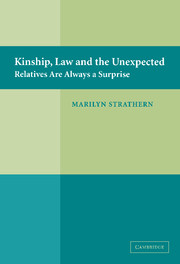Preface
Published online by Cambridge University Press: 08 January 2010
Summary
Anthropologists use relationships to uncover relationships. The device is at the heart of social anthropology, and anthropologists also find it at the heart of kinship. This book would not have been possible but for the wave of anthropological writing that has gone under the name of ‘the new kinship’ (studies), although it does not fall into the genre. I wish to add a footnote about the role that appeals to relationality play in anthropological studies of social life and suggest why we should be interested in it. Appeals are made to a phenomenon at once contingent (on certain ways of knowing) and ubiquitous (to human society).
One of the enduring methodological conundrums of anthropology is how to hold in the same view what are clearly cultural and historical constructs and what are equally clearly generalities about social existence. The trick is to specify each without diminishing the other. If this is an attempt, by its very nature the present work must be incomplete precisely because of the specific circumstances that have suggested kinship as an intriguing field for investigation here. The field already limits (‘constructs’) the exercise.
The specific circumstances are epitomised in the new kinship. Studies under this rubric focus on the reflexive nature of analytical constructs, and very often on people's dealings with one another under new technological regimes, with the stimulus to indigenous reflexivity that brings; people come to make new kinds of connections between their lives and the world they live in.
- Type
- Chapter
- Information
- Kinship, Law and the UnexpectedRelatives are Always a Surprise, pp. vii - xPublisher: Cambridge University PressPrint publication year: 2005

